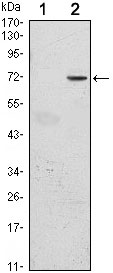GFI1 Antibody
Purified Mouse Monoclonal Antibody
- 产品详情
- 实验流程
Application
| WB, E |
|---|---|
| Primary Accession | Q99684 |
| Reactivity | Human |
| Host | Mouse |
| Clonality | Monoclonal |
| Clone Names | 5D7 |
| Isotype | IgG1 |
| Calculated MW | 45297 Da |
| Description | This gene encodes a nuclear zinc finger protein that functions as a transcriptional repressor. This protein plays a role in diverse developmental contexts, including hematopoiesis and oncogenesis. It functions as part of a complex along with other cofactors to control histone modifications that lead to silencing of the target gene promoters. Mutations in this gene cause autosomal dominant severe congenital neutropenia, and also dominant nonimmune chronic idiopathic neutropenia of adults, which are heterogeneous hematopoietic disorders that cause predispositions to leukemias and infections. Multiple alternatively spliced variants, encoding the same protein, have been identified for this gene.Expression of GFl1 ranges from the hematopoietic and lymphoid system, to sensory epithelia, lung and parts of the CNS. |
| Immunogen | Purified recombinant fragment of human GFI1 expressed in E. Coli. |
| Formulation | Ascitic fluid containing 0.03% sodium azide. |
| Gene ID | 2672 |
|---|---|
| Other Names | Zinc finger protein Gfi-1, Growth factor independent protein 1, Zinc finger protein 163, GFI1, ZNF163 |
| Dilution | WB~~1/500 - 1/2000 E~~N/A |
| Storage | Maintain refrigerated at 2-8°C for up to 6 months. For long term storage store at -20°C in small aliquots to prevent freeze-thaw cycles. |
| Precautions | GFI1 Antibody is for research use only and not for use in diagnostic or therapeutic procedures. |
| Name | GFI1 |
|---|---|
| Synonyms | ZNF163 |
| Function | Transcription repressor essential for hematopoiesis (PubMed:11060035, PubMed:17197705, PubMed:17646546, PubMed:18805794, PubMed:19164764, PubMed:20190815, PubMed:8754800). Functions in a cell- context and development-specific manner (PubMed:11060035, PubMed:17197705, PubMed:17646546, PubMed:18805794, PubMed:19164764, PubMed:20190815, PubMed:8754800). Binds to 5'-TAAATCAC[AT]GCA-3' in the promoter region of a large number of genes (PubMed:11060035, PubMed:17197705, PubMed:17646546, PubMed:18805794, PubMed:19164764, PubMed:20190815, PubMed:8754800). Component of several complexes, including the EHMT2-GFI1-HDAC1, AJUBA-GFI1-HDAC1 and RCOR-GFI-KDM1A- HDAC complexes, that suppress, via histone deacetylase (HDAC) recruitment, a number of genes implicated in multilineage blood cell development (PubMed:16287849). Regulates neutrophil differentiation, promotes proliferation of lymphoid cells, and is required for granulocyte development (PubMed:12778173). Inhibits SPI1 transcriptional activity at macrophage-specific genes, repressing macrophage differentiation of myeloid progenitor cells and promoting granulocyte commitment (By similarity). Mediates, together with U2AF1L4, the alternative splicing of CD45 and controls T-cell receptor signaling (By similarity). Regulates the endotoxin-mediated Toll-like receptor (TLR) inflammatory response by antagonizing RELA (PubMed:20547752). Cooperates with CBFA2T2 to regulate ITGB1-dependent neurite growth (PubMed:19026687). Controls cell-cycle progression by repressing CDKNIA/p21 transcription in response to TGFB1 via recruitment of GFI1 by ZBTB17 to the CDKNIA/p21 and CDKNIB promoters (PubMed:16287849). Required for the maintenance of inner ear hair cells (By similarity). In addition to its role in transcription, acts as a substrate adapter for PRMT1 in the DNA damage response: facilitates the recognition of TP53BP1 and MRE11 substrates by PRMT1, promoting their methylation and the DNA damage response (PubMed:29651020). |
| Cellular Location | Nucleus Note=Colocalizes with PIAS3 and RUNX1T1 in nuclear dots |
Research Areas
For Research Use Only. Not For Use In Diagnostic Procedures.
Application Protocols
Provided below are standard protocols that you may find useful for product applications.
REFERENCES
1. Genome Res. 2006 Jan;16(1):55-65. 2. Blood. 2007 Jan 1;109(1):100-8. 3. J Steroid Biochem Mol Biol. 2007 Mar;103(3-5):742-6.
终于等到您。ABCEPTA(百远生物)抗体产品。
点击下方“我要评价 ”按钮提交您的反馈信息,您的反馈和评价是我们最宝贵的财富之一,
我们将在1-3个工作日内处理您的反馈信息。
如有疑问,联系:0512-88856768 tech-china@abcepta.com.























 癌症的基本特征包括细胞增殖、血管生成、迁移、凋亡逃避机制和细胞永生等。找到癌症发生过程中这些通路的关键标记物和对应的抗体用于检测至关重要。
癌症的基本特征包括细胞增殖、血管生成、迁移、凋亡逃避机制和细胞永生等。找到癌症发生过程中这些通路的关键标记物和对应的抗体用于检测至关重要。 为您推荐一个泛素化位点预测神器——泛素化分析工具,可以为您的蛋白的泛素化位点作出预测和评分。
为您推荐一个泛素化位点预测神器——泛素化分析工具,可以为您的蛋白的泛素化位点作出预测和评分。 细胞自噬受体图形绘图工具为你的蛋白的细胞受体结合位点作出预测和评分,识别结合到自噬通路中的蛋白是非常重要的,便于让我们理解自噬在正常生理、病理过程中的作用,如发育、细胞分化、神经退化性疾病、压力条件下、感染和癌症。
细胞自噬受体图形绘图工具为你的蛋白的细胞受体结合位点作出预测和评分,识别结合到自噬通路中的蛋白是非常重要的,便于让我们理解自噬在正常生理、病理过程中的作用,如发育、细胞分化、神经退化性疾病、压力条件下、感染和癌症。






